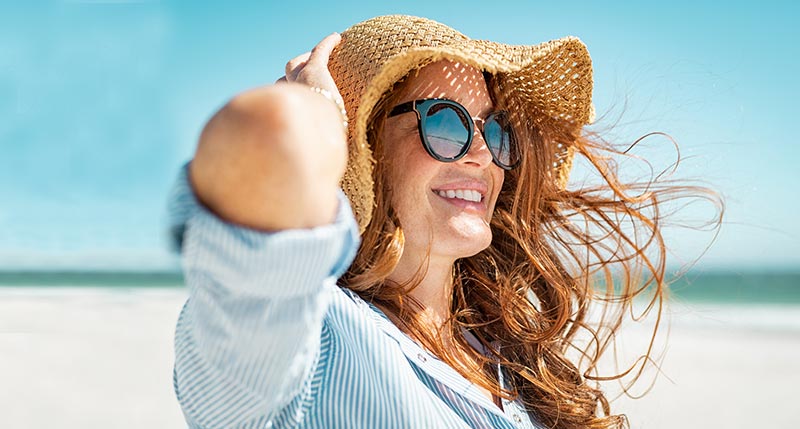Are you aware that your eyes can get sunburned? Yes, just like your skin, your eyes can be burned by direct or reflected ultraviolet (UV) rays. As the summer weather gets hotter and you enjoy the season’s outdoor activities, your eyes are exposed to greater amounts of the sun’s intense and damaging UV rays.
Increased outdoor activity such as yard work, warm weather sports, or a day at the beach can pose a threat to your eyes and to the sensitive skin surrounding them. Nobody wants a case of photokeratitis to slow down the summer fun. What is photokeratitis, you ask? It’s literally a sunburn to the eye that causes inflammation of the cornea — the clear, rounded structure that covers the iris and pupil.
This painful sunburn can lead to redness, blurred vision, itchy, watery eyes, sensitivity to light, gritty eyes, or a headache. Additionally, ongoing exposure to the sun’s harmful rays over the years can cause cataracts, macular degeneration, and pterygium (a fleshy growth on the surface of the eye).
So, what’s the solution to protecting your eyes from those damaging ultraviolet rays?
SUNGLASSES! A very simple yet very effective solution that protects your eyes. Everyone wants to look stylish and cool in their sunglasses but there are some important points to remember when selecting a pair to ensure the best protection for your eyes.
- Insist on 100% UVA and UVB Protection. UV Coating is the most important feature of a good pair of sunglasses. Just as you apply sunscreen to your skin to protect it from ultraviolet rays, a UV coating applied to your sunglasses lenses blocks UV rays from harming your eyes. And remember to wear those sunglasses not only throughout the long days of summer but year-round, and even on cloudy days.
- Get Coated: Coating Options for Sunglasses
- Anti-reflective (AR) coating: Eliminates reflections on the surface of your sunglasses, which allows for clearer vision. Some sunglasses even offer AR coating on both the front and back of the lenses, for extra visual comfort in bright conditions.
- Mirror coating: Applied to the front of your lenses, it is the first line of defense for reflecting harmful UV light away from your eyes, just like a mirror! The coating is applied to the front of your lenses to deflect sunlight. Not only does it prevent UV rays from damaging your eyes but it can also help you avoid squinting and the eyestrain associated with intense or direct sunlight. Bonus: Friends and loved ones will enjoy checking out their reflection in your mirrored lenses.
- Polarized lenses: Polarization filters out the reflected light from water, snow, sand, and pavement to help reduce glare and eyestrain. It’s all about visual comfort plus the added safety feature that polarized lenses offer when you’re participating in outdoor activities, driving, or just relaxing by the pool.
- Bigger is Better: Go big! Choose a comfortably fitting larger frame that contours to your face to protect even more of the delicate skin around your eyes. Also consider wrap-around frames that offer extra protection from UV rays by reducing the amount of UV on the top, sides, and bottom of your face.
- Darker Lenses Are Not Better: Wearing very darkly tinted sunglasses doesn’t guarantee better protection from the sun’s UV rays. The effectiveness of your lenses in blocking harmful rays depends solely on their UV coating. The color and tint of lenses is a personal preference based on where you wear your sunglasses and the activities you participate in. Consider these colorful choices:
- Gray tints block the most light, so if you have light-sensitive eyes, go with gray. Gray is also best for driving since colors appear the most accurate.
- Green or dark brown tints elevate depth perception and are a favorite of people who play tennis, baseball, or golf because the tints balance UV light without altering the landscape light.
- Yellow or orange tints increase contrast and allow you to see more detail in the landscape when you participate in snow sports.
- Blue tint helps block out bluer lights and reduce light glare – if you are a boater or fisherman, blue is for you!
- Double-Up Protection: Do you wear UV-blocking contact lenses? Then why not double-up your eye protection? While UV-blocking contact lenses can protect the cornea, iris, and pupil, they leave the conjunctiva, eyelid, and surrounding skin exposed. When you add 100% UV protective sunglasses, you gain comprehensive protection against the harmful rays of the sun.
The bottom line where sunglasses are concerned: Consider all of the options and elements of a good pair of sunglasses, and choose wisely. Yes you can have it all — both style and UV protection.
Come in and ask our optical department team members which sunglasses they recommend for your unique lifestyle and visual challenges. Our team members are knowledgeable and experienced, and will help you choose the right coatings and frames so you can enjoy summer while seeing your best and protecting your eyes from the sun’s UV rays.
Enjoy the long, lazy days of summer!

